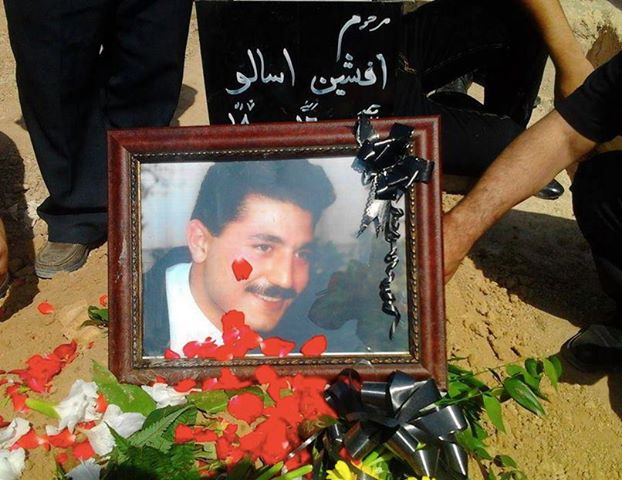Security Forces Closely Watch Osanloo’s Memorial Service

In 2010, the Tehran Revolutionary Court sentenced labor activist Afshin Osanloo, 42, brother of labor leader Mansour Osanloo, and a member of the Tehran and Suburbs Vahed Bus Syndicate, to five years in prison on charges of “collusion and assembly with the intent to act against national security.” He was transferred from Evin Prison to Rajaee Shahr Prison in Karaj in 2012. He died on the eve of June 20 at Karaj’s Rajaee Shahr Hospital. His cause of death was announced as a “heart attack.” He was buried at Tehran’s Behesht-e Zahra Cemetery on June 24.
“Even if I accept the assumption that my son died of a heart attack, I do not accept why the prison authorities had to send him to the hospital so late. The hospital personnel told my daughters that Afshin had died a long time before his transfer to the hospital,” Fatemeh Golgazi told the Campaign.
Golgazi told the Campaign that she does not believe her son died of a heart attack. “We asked for an autopsy during the very first days after Afshin’s death. They said the answer will be prepared in three months, but I will not keep silent. I will pursue this case. I have not been feeling well so far, but from now on, I will follow up on the case with the help of my lawyer. I don’t believe Afshin died as a result of a heart attack, because he did not have a history of heart disease. I saw him seven days before his death. He was well and cheerful,” Afshin Osanloo’s mother told the Campaign.
In 2010, the Tehran Revolutionary Court sentenced labor activist Afshin Osanloo, 42, brother of labor leader Mansour Osanloo, and a member of the Tehran and Suburbs Vahed Bus Syndicate, to five years in prison on charges of “collusion and assembly with the intent to act against national security.” He was transferred from Evin Prison to Rajaee Shahr Prison in Karaj in 2012. He died on the eve of June 20 at Karaj’s Rajaee Shahr Hospital. His cause of death was announced as a “heart attack.” He was buried at Tehran’s Behesht-e Zahra Cemetery on June 24.
In a June interview, Osanloo’s sister told the Campaign that nurses at the hospital told her that her brother had died a long time before reaching the hospital. However, Sohrab Soleimani, Head of Tehran Province Prisons, told Fars News Agency on June 22, “After complaining about chest pain at Rajaee Shahr Prison in Karaj on June 20, he was transferred to the prison infirmary. After examination and an EKG, he was transferred to Shahid Rajaee Prison in Karaj, and after a few hours, he died after a heart attack.”
Osanloo’s mother described the restrictions at her son’s memorial. “Fortunately, or unfortunately—I really don’t know what to say anymore—there were a lot of forces there, but nothing happened and we were able to hold he ceremony. They just kept pointing to us not to talk too much and they wanted us to end the ceremony quickly. When one of us would go to the loudspeaker to say something, they would gesture to us not to say anything extra. Thank God there was a large crowd and we were able to hold a good ceremony,” Golgazi said.
“I hope political prisoners, especially the imprisoned workers, are not abused and their illnesses and medical needs are addressed. They each have a family who is worried for their conditions outside, and their sudden death behind the prison walls is the last thing they want. I hope the authorities will act fairly,” Afshin Osanloo’s mother concluded.






